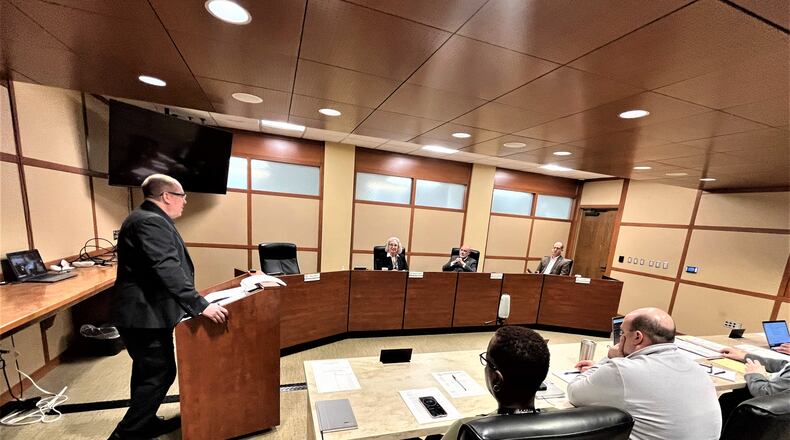Republican board members Erik Blaine and Thomas Routsong voted to put Esrati on the ballot.
Democratic board member Barbara Gorman said she thinks the board is making a mistake and is overstepping its bounds. The other Democratic board member, Rhine McLin, was absent from Friday’s meeting.
Dayton City Commission is a nonpartisan race, but Esrati is a Democrat, as are incumbents Chris Shaw and Matt Joseph.
“The Board of Elections processes elections — it does not make rules for cities, it does not change charters, it does not interpret charters different than has been interpreted by that city without some valid reasons for doing it,” Gorman said. “I’m also afraid that the ruling today will cause a lot of concern and perhaps chaos in how petitions are checked.”
Blaine said it’s Dayton’s fault that its petition forms and charter language regarding petition requirements are ambiguous and lack clear guidance for evaluating the issue of signature duplication.
Blaine said moving forward the Board of Elections needs to determine and put into place a clear process, policy and procedure when it comes to dealing with these matters.
Routsong said this should be a “good kick in the butt” for the city of Dayton to review and improve its documents and rules.
Seven people filed petitions by the March 3 deadline to run for two open Dayton City Commission seats this fall. Five candidates were certified to the ballot by the Board of Elections on March 14 — incumbent Commissioners Shaw and Joseph and challengers Jordan Wortham, Marcus Bedinger and Valerie Duncan.
The addition of Esrati means voters will pick from six candidates in the May 2 run-off election, which will shrink the field to four candidates. The top four vote-getters on May 2 will be on the November ballot for the two seats.
Petitions that had been filed by Esrati and Jo Love were invalidated by the board earlier this month for failing to have the 500 valid signatures required by city charter.
After their petitions were invalidated, Esrati and Love asked the Board of Elections for reconsideration. Those hearings took place on Friday and lasted more than two hours.
Esrati, a vocal citizen activist and business owner, had been ruled 18 valid signatures short of meeting the 500-signature threshold, while Love’s petitions were 41 short.
Esrati accused the Board of Elections of wrongly not counting some of the signatures on his petition as valid because the same electors signed at least two other candidates’ petitions.
Under the city charter, Dayton electors are only allowed to sign the petitions of two people running for the city commission when there are two open seats.
Esrati said some of the signatures he obtained that elections officials ruled as invalid duplicates were actually signed before those electors signed other candidates’ petitions. He said that is clear from the dates put next to their signatures.
Elections officials said they counted signatures as valid or duplicates based on when the petitions were turned in, not based on the date the signatures were obtained.
Esrati turned in his petitions March 3, the submission deadline.
Montgomery County Board of Elections Director Jeff Rezabek said the longstanding practice dating back decades has been to count signatures as either valid or invalid duplicates based on when the petitions were filed.
Barbara Doseck of the city of Dayton’s law department, indicated in an opinion issued on Thursday that the city charter does not require people to list the dates when they sign candidates’ petitions.
Doseck also wrote that the city is aware of the Board of Elections’ practice to use petitions’ filing dates to determine which petitions have duplicate signatures that are ruled invalid.
“Because a signature date is not required, this process is logical and not contradicted by the Dayton charter,” she wrote.
Rezabek recommended the board deny Esrati’s petitions.
But Blaine pointed out an oddity — the Dayton city charter does not require signers to provide the date of their signatures, but the petition forms nevertheless contain lines for dates.
He said that calls into question whether the dates should have relevance when it comes to evaluating signature duplication.
The Board of Elections on Friday also voted 3-0 that Love did not meet the burden to appear on ballot.
Love claimed Ohio election laws should give her an opportunity to get additional signatures because her petitions were valid.
She said she only learned about Friday’s meeting the day before and she should have been given sufficient time to prepare for it and collect signatures.
Rezabek said Love produced no new evidence or information justifying why she should be placed on the ballot when she did not have enough valid signatures.
About the Author



